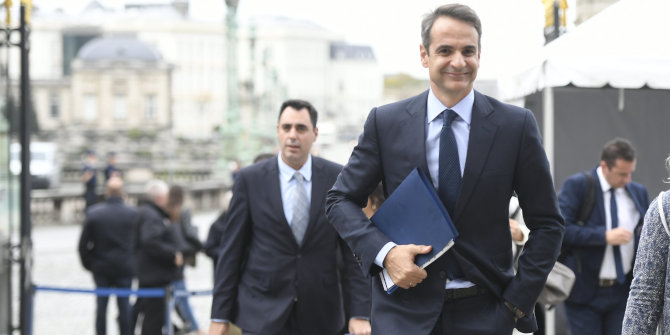 The discovery of thousands of illegally wiretapped recordings generated a major scandal in North Macedonia in 2015. Following the scandal, there were renewed demands to tackle corruption and state capture. Misha Popovikj argues that the experience in the four years since highlights why anti-corruption strategies must be built on a thorough diagnosis of the problem.
The discovery of thousands of illegally wiretapped recordings generated a major scandal in North Macedonia in 2015. Following the scandal, there were renewed demands to tackle corruption and state capture. Misha Popovikj argues that the experience in the four years since highlights why anti-corruption strategies must be built on a thorough diagnosis of the problem.
Back in 2015, European Commission adviser Reinhard Priebe and his team of rule of law experts arrived in North Macedonia amidst a political crisis. That same year, the Macedonian political opposition had revealed audio recordings carried out illegally by the secret police, and uncovered evidence of mass corruption and abuse of power. Priebe’s task was to provide the European Union with a quick assessment and recommendations on urgent reform priorities in relevant areas – corruption in the judiciary, politicised administration, media clientelism, and the uneven playing field in electoral competition.
In June 2015, he delivered a document that set future benchmarks for assessing the readiness of the country to start its EU accession process. Shortly afterwards, a group of NGOs began to transform these recommendations into specific reforms. The idea was to set a ‘Blueprint‘ – a guide of sequenced changes achievable within 12 months. The Social Democrats, then in opposition, vowed to include these recommendations in their reforms should they win a majority in the 2016 elections.
Widespread aspirations to join the EU provided leverage for these proposals. Priebe’s recommendations were, in essence, new conditions set by the European Commission for accession. The Blueprint reforms were backed by foreign embassies in the country. The logic of the anti-corruption measures in the Blueprint was to immediately improve procedures and practices, as well as oversight in areas where it was known that institutions were being captured by private interests. These tasks were to build upon external monitoring and past analyses to accelerate the democratisation process.
In parallel, the gatekeepers responsible for corruption were to be dismissed (or asked to resign) and replaced. The purpose was not only to attribute responsibility for state capture to former prime minister Nikola Gruevski and his close associates, but to demonstrate that, along with them, a whole set of leadership figures bore responsibility for deeply-embedded corruption through personal failings. If Gruevski alone was guilty, this would continue the practice of evading responsibility as it would imply that following illegal orders was a practice that could be condoned.
Lastly, an analysis such as Priebe’s was to underpin any change of policy, strategy, or procedures. The idea was that once institutions open, the critical issue is to study how state capture happens at the institutional level, to avoid the same pitfalls going forward. This would inform any future development and reforms.
One example was the demand for corruption risk assessments in critical institutions, such as those distributing social benefits and subsidies, inspectorates, and law enforcement. These institutions were used to buy loyalty from voters and companies through clientelism and punish those favouring the opposition, while law enforcement turned a blind eye to the abuses. The necessity for risk assessments grew from the understanding that corruption is ever-changing: it always exploits a particular procedure within an institution or the lack of integrity of a specific official, while often leveraging inefficiencies.

Protesters in Skopje, April 2016, Credit: Vanco Dzambaski (CC BY-NC-SA 2.0)
When the Social Democrats won the elections against the right-wing VMRO-DPMNE in 2016 and formed the government in 2017, they initiated a plan of quick reforms called 3-6-9 – a set of changes that should be achieved in three phases – in the first three, six and nine months. The plan included improvements set out in the Priebe and Blueprint reports.
The goal was to demonstrate progress in critical areas of Priebe’s report alongside the delivery of high-profile cases of corruption and abuse of office. These included reforms in the public administration, judiciary and intelligence services and progress in the fight against corruption. This progress was to convince EU member states that rule of law reforms had started and, once the name issue with Greece was solved, to set a date for starting accession negotiations.
These benchmarks were met, according to the EU country report on North Macedonia in 2019. There had been progress in judicial and public administration reforms, while the State Commission on Prevention of Corruption had been newly constituted and had improved practices. The European Commission noted a good track record on high-profile court cases, as well.
However, the reforms did not follow the internal logic of these documents, in particular, the Blueprint’s guidance on sequencing. The changes were initiated without undertaking a single corruption risk assessment on any of the critical institutions. This was even despite the politicised hierarchy in the police failing to protect the Parliament and allowing an angry mob to attempt to lynch MPs on 27 April, 2017. While the chief official in charge of the police hierarchy, Mitko Chavkov, was sentenced, amongst others, for the incident, the question of why the ground forces waited for orders while witnessing an apparent attempted coup d’état is still unanswered.
Therefore, the reform strategy did not learn from past mistakes. Plans and policies were created without research to substantiate them. Fixing corruption depends on understanding three questions – what happens, why it happens, and how. Without in-depth knowledge about which procedures and practices fail to prevent state capture at an institutional level, assessment of the effectiveness of anti-corruption policies is not possible.
Furthermore, the new government did not demonstrate readiness to exert pressure on second-tier officials who permitted the capture of institutions. The chief public prosecutor Marko Zvrlevski, deemed loyal to the previous government, was the single notable official who was replaced. Parliament did not ask for resignations from the Judicial Council, the media regulator, nor the anti-corruption Commission.
In summary, two and a half years after the change of government, the authorities in North Macedonia were rushing to show the EU a track record of reform activities. But they missed two crucial opportunities.
First, they failed to demonstrate that the rules of the game in society had changed, and that everyone would be held responsible for their part in state capture. For some, this would have meant indictments, for others, only dismissal. But an example for the future would have been set, emphasising that personal responsibility is the path to integrity.
Second, a comprehensive diagnostics system for corruption risk assessment should have been designed for several significant areas – subsidies, benefits and law enforcement. These assessments would have informed policymaking and would have better prepared the country for the next steps in the EU accession process – if it happens at all.
Please read our comments policy before commenting.
Note: This article was published by the Centre for the Study of Corruption at the University of Sussex in the run-up to the event New Actors and Strategies for Fighting and Investigating Corruption in the Western Balkans. It gives the views of the author, not the position of EUROPP – European Politics and Policy or the London School of Economics.
_________________________________
 Misha Popovikj – IDSCS
Misha Popovikj – IDSCS
Misha Popovikj coordinates the Good Governance programme at the Institute for Democracy Societas Civilis Skopje – IDSCS.




